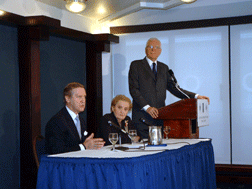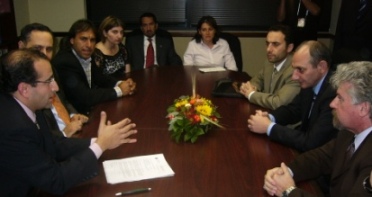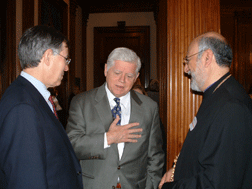TURKEY AND ITS CHRISTIANS: THE CROSS AND THE CRESCENT
in Samsun, on the Black Sea, he has had death threats and his church
has been repeatedly stoned. Local newspapers called him a foreign
agent. A group of youths tried to kidnap him as he was driving home.
His pleas for police protection have gone unheeded.
Mr Ant is not alone. All over Turkey, Christians are under attack. In
January Hrant Dink, an ethnic Armenian newspaper editor, was shot dead
in Istanbul by a teenager who said he had "insulted Turkishness". In
April two Turks and a German, all evangelists, were murdered in
Malatya. Their killers bound and tortured them before slitting their
throats. In December an Italian Catholic priest was knifed by a
teenager in Izmir. Another Italian priest was shot dead in Trabzon
in 2006.
Many blame the attacks on a new ultra-nationalism, tinged with Islamic
militancy, that has swept across Turkey. Unemployed teenagers in the
Black Sea region seem especially prone to it. "The plight of Christians
is critical," says Husnu Ondul, president of the Ankara-based Turkish
Human Rights Association. Like many others, he believes that the "deep
state", comprising a few judges, army officers and security officials
who need enemies to justify their grip on power, is behind the attacks.
That may seem far-fetched. Yet evidence leaked to the media in the
Dink and Malatya cases points to collusion between the perpetrators
and rogue elements in the police and the army. It also suggests that
the Istanbul police were tipped off about Mr Dink's murder a year
before it was carried out. "So why did the Istanbul police do nothing
to prevent it?" wonders Ergin Cinmen, a lawyer for the Dink family.
Respecting the religious freedom of non-Muslims is essential to
Turkey's hopes of joining the European Union. Laws against Christians
repairing their churches have been relaxed. Overriding objections
from pious constituents, the ruling Justice and Development (AK)
party has just restored an ancient Armenian church in eastern Turkey. {!!}
School textbooks are being purged of an anti-Western bias.
Yet many Christian grievances remain. The prime minister, Recep
Tayyip Erdogan, resists calls to reopen the Greek Orthodox Halki
seminary on Heybeli island off Istanbul, shut down in 1971. Turkey
refuses to recognise the ecumenical title of the Greek Orthodox
patriarch, Bartholomew I, the spiritual leader of over 200m Orthodox
Christians. The patriarch, a loyal Turkish citizen, has lobbied hard
for Turkey's EU membership. But this has only reinforced suspicions
among ultra-nationalist detractors, who accuse him of trying to
"Christianise" Turkey and wanting a Vatican-style state in the heart
of Istanbul.
Never mind that the Greek Orthodox church in Istanbul has dwindled
to 4,000 souls, many of them too old to follow their children abroad.
Nor that the patriarch must under Turkish law be a Turkish citizen, a
rule which is making it difficult to find a successor to Bartholomew
I. "They [ie, the Turks] apparently won't regard the conquest of
Constantinople as complete until the patriarchate ceases to exist and
all Christians have been frightened away," suggests one restorer of
icons in Istanbul.
The government has yet to approve a draft bill to help non-Muslims
recover thousands of properties that have been confiscated by the state
and either sold or left to decay. The Aya Yorgi church in Istanbul's
Edirnekapi district, which was badly damaged in an earthquake, is one
sad example. Its walls are cracked, its roof is leaking; a marble angel
lies in pieces on the floor. "All we ask is to be permitted to rescue
our church, but we cannot hammer a single nail," complains Bishop
Dionysios, a Greek Orthodox prelate who still conducts services there.
Many Christians concede that AK has treated them better than its
secular predecessors did. They blame the deep state for their recent
troubles. But the excuse of the deep state's power is wearing thin
after AK's big victory in July's general election. "With such a strong
mandate, the government's failure to meet our demands can only mean
one thing, that the deep state is still in charge," says a Christian
priest. Or perhaps that AK believes in religious freedom for Muslims,
but not Christians.





 WASHINGTON, DC – The credibility of former Secretary of State Madeleine Albright and former Secretary of Defense William Cohen in leading a newly launched genocide prevention initiative was called into question, today, by reporters who cited their ongoing efforts to block Congressional reaffirmation of the Armenian Genocide (H.Res.106 / S.Res.106), reported the Armenian National Committee of America (ANCA).
WASHINGTON, DC – The credibility of former Secretary of State Madeleine Albright and former Secretary of Defense William Cohen in leading a newly launched genocide prevention initiative was called into question, today, by reporters who cited their ongoing efforts to block Congressional reaffirmation of the Armenian Genocide (H.Res.106 / S.Res.106), reported the Armenian National Committee of America (ANCA).
 Washington, DC - His Eminence Archbishop Oshagan Choloyan, Prelate of the Eastern Prelacy of the Armenian Apostolic Church of America, met with over a dozen Members of Congress last week on issues of concern to the Armenian faithful, including the moral imperative of America adopting a principled stand on the Armenian Genocide and against all instances genocide, reported the Armenian National Committee of America (ANCA).
Washington, DC - His Eminence Archbishop Oshagan Choloyan, Prelate of the Eastern Prelacy of the Armenian Apostolic Church of America, met with over a dozen Members of Congress last week on issues of concern to the Armenian faithful, including the moral imperative of America adopting a principled stand on the Armenian Genocide and against all instances genocide, reported the Armenian National Committee of America (ANCA).